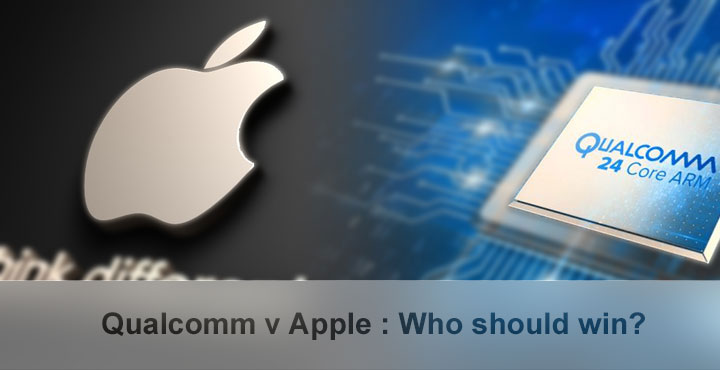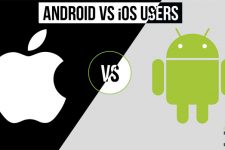
If you know anything about smartphones, especially Android smartphones, there’s no way you haven’t heard of Qualcomm. Throughout the years, a lot has been said about Qualcomm’s products, mostly the company’s Snapdragon SoCs. But recently, the focus has been shifting from the chipset company’s products to the company itself. There’s a good chance you’ve read about Apple going up against Qualcomm. There are a lot of articles about the same and mostly they talk about legal matters and how everyone is turning against Qualcomm.
This sort of paints Qualcomm as the big bad company. And you know it’s bad when not only Apple’s iPhone partners but also some of its competitors are siding with it. But what is all the fuzz about?
Qualcomm has done tremendous work
Well, let’s start by saying that Qualcomm has done an amazing job when it comes to its products. Qualcomm’s chipsets have driven the smartphone revolution for a good chunk of time now. Even though their CPUs and GPUs are no more the best, their networking technology is still unmatched. The technology used in these products was developed by the company itself too. And like any other company, they got it patented.
Including Qualcomm’s networking technology (Bluetooth, Wi-Fi, and LTE) is a must if you want to sell your phone anywhere in North America. Yes, Canada too. This is because not only is it the best, but also it is absolutely necessary to connect to the current as well as future generation of LTE networks in the said region. This earned Qualcomm a fair-use patent for its LTE technology. Meaning anyone can use it, but for a cost.
Also read: Maximize Sound Quality on Qualcomm Devices with Hi-Performance DAC Enabler
That sounds fair, doesn’t it? You’ve done some amazing work and now everybody wants to make a profit off your work. It is only just that you get a cut out of that.
But …
But this is where the problem starts. The way Qualcomm is charging for their patents has other companies such as Apple up in arms. The Snapdragon manufacturer has different pricing models for those who buy the full Snapdragon package and those who just want the network patents. This is why Samsung hasn’t brought its Exynos powered devices to North America even though they’re arguably the better versions.
This isn’t something that other companies don’t or won’t do. In fact, it is a fine way of urging customers to buy your product. Everyone does this, from restaurants to smartphone manufacturers themselves. So when some companies stand up against Qualcomm for the pricing model, you’ve got to side with Qualcomm.
That is not the only problem, however. Instead of a fixed price for its patents, Qualcomm is charging a fixed percentage out of the retail price of the product. Qualcomm is said to be charging around 7% of the price out of every device sold under its FRAND (Fair, Reasonable, And Non-Discriminatory) terms. This gives rise to a couple of issues.
The pricing conundrum
First, this would mean that if I’m selling a $400 device, and you’re selling a $700 device with the same internals but yours is a more premium device, you’ll be paying more to Qualcomm for the same technology. If you didn’t already get why that makes no sense, let me explain a little.
Let’s take the 32GB iPhone 7 and the 256GB iPhone 7 Plus as examples. Now, Apple makes it’s own processors and Intel’s LTE modem. And they are supposed to pay more to Qualcomm for the 256GB iPhone 7 Plus compared to the 32GB iPhone 7 when the price difference is because of a larger display, better camera sensors, more battery life, extra storage etc. All of which are made by Apple and it’s partners and do not involve the use of Qualcomm’s patents.
In other words, as the prices for other components of a smartphone (materials used for the display, camera glass, body, etc.) rise, Qualcomm earns more money. So in a way Qualcomm is earning money on things it hasn’t made or has no relation to in any way. Even hardcore Apple haters will have to acknowledge that this can not be justified.
Over-charging for patents
Yes, Apple accusing Qualcomm of overcharging is ironic. But not every company is a Samsung or Apple. These are huge behemoths and even if they do pay a 7% cut of their large profit margins to Qualcomm, they still make a lot. Samsung makes around 20% profit on average while for Apple it’s above 30%, sometimes way above. Many companies don’t even have a profit margin of 7%. So they’re out of business, and it’s no short of a death blow to companies who can make a profit of 7% to 10%. Such companies can’t afford that big a cut in their profit margins. Qualcomm has used the fair-use patents to drive such companies out of the competition.
So what is your take on the whole Qualcomm vs the rest battle? Do you think Qualcomm is fair is the usage of its patent licenses? I’m no legal expert and sure some of you might be more familiar with patent laws, feel free to shed some light if you feel like.




Join The Discussion: